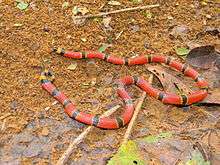Micrurus browni
| Micrurus browni | |
|---|---|
 | |
| Scientific classification | |
| Kingdom: | Animalia |
| Phylum: | Chordata |
| Class: | Reptilia |
| Order: | Squamata |
| Suborder: | Serpentes |
| Family: | Elapidae |
| Genus: | Micrurus |
| Species: | M. browni |
| Binomial name | |
| Micrurus browni Schmidt & H.M. Smith, 1943 | |
Micrurus browni, commonly known as Brown's coral snake, is a species of venomous elapid snake native to southwestern Mexico and Guatemala.[1] There are three recognized subspecies, including the nominate subspecies described here.[2]
Etymology
The specific name, browni, is in honor of American herpetologist Bryce Cardigan Brown (1920–2008).[3]
Spanish common names
Common names for M. browni in Spanish include Serpiente-coralillo de Brown,[2] coral, coral de Acapulco, coral de Antigua, coral (or coralillo) de canutos, and vibora de coral.[1]
Description
Brown's coral snake can grow to 100 cm (39 in) in total length (including tail), but it is usually 50 cm (20 in) to 70 cm (28 in). It has smooth dorsal scales, a rounded head, and eyes with round pupils. Its color pattern is three-colored: broad red bands, separated by 10-27 black bands, each bordered with a narrow yellow ring.[1] The snout is black. There is usually a yellow ring, across the top of the head, halfway back.
Geographic range
The geographic distribution of M. browni is limited to Quintana Roo in southwestern Mexico, and western Guatemala, including Sacatepequez. Previous reports for Honduras have been found to be incorrect.[1]
Habitat
M. browni is mainly found in tropical deciduous forest, pine-oak forest, and cloud forest at elevations ranging from sea level up to 2,000 m (6,600 ft).[1]
Behavior
Although little is known about the behavior of M. browni, like most other coral snakes it may be nocturnal, terrestrial and probably dwells in burrows, leaf litter, or under logs.[1] While usually not aggressive, it will bite when molested or restrained.
Diet
M. browni feeds on small lizards, amphibians, invertebrates, and other snakes.[1]
Reproduction
Like other members of the genus Micrurus, M. browni is oviparous and may lay a maximum of 15 eggs per clutch.[1]
Venom
Little is known about the effects of M. browni venom. It may contain neurotoxin, which can cause neuromuscular dysfunction, as is the case with the venom of other coral snakes.[1]
Subspecies
There are three recognized subspecies of Micrurus browni:
- Micrurus browni browni Schmidt & H.M. Smith, 1943
- Micrurus browni importunus Roze, 1967
- Micrurus browni taylori Schmidt & H.M. Smith, 1943
The subspecific name, taylori, is in honor of American herpetologist Edward Harrison Taylor.[3]
References
- 1 2 3 4 5 6 7 8 9 Armed Forces Pest Management Board (AFPMB). "Micrurus browni ". AFPMB Living Hazards Database. AFPMB. Retrieved 2011-02-17.
- 1 2 "Micrurus browni ". Integrated Taxonomic Information System. Retrieved 17 February 2011.
- 1 2 Beolens, Bo; Watkins, Michael; Grayson, Michael (2011). The Eponym Dictionary of Reptiles. Baltimore: Johns Hopkins University Press. xiii + 296 pp. ISBN 978-1-4214-0135-5. (Micrurus browni, p. 40; M. b. taylori, p. 261).
Further reading
- Schmidt KP, Smith HM (1943). "Notes on coral snakes from México". Field Mus. Nat. Hist. Zool. Ser. 29 (2): 25-31. (Micrurus browni, new species, pp. 29–30; Micrurus nuchalis taylori, new subspecies, pp. 30–31).
| Wikispecies has information related to Micrurus browni |
| Wikimedia Commons has media related to Micrurus. |